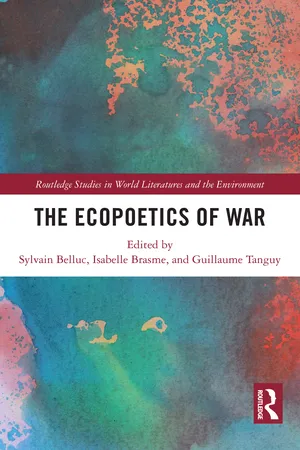
- 232 pages
- English
- ePUB (mobile friendly)
- Available on iOS & Android
The Ecopoetics of War
About this book
The Ecopoetics of War explores the interrelationality of human and nonhuman entities in the context of conflict, as recorded in literature and culture. This collection of essays demonstrates the specific and fertile role of literature in representations of war, as it foregrounds the manifold ways in which the borders between human and nonhuman—including flora,fauna, and technology—become porous, thus questioning traditional onto-epistemological and ethical categories.
Bringing together British, American, and postcolonial studies, The Ecopoetics of War covers a variety of historical periods, geographical areas, and literary genres. Interdisciplinary in its outlook, it intertwines war studies, ecocriticism, literary theory, philosophy, and cultural studies. By analyzing the stylistic and discursive strategies devised by writers to translate the sensory experience of the battlefield, the contributors shed light on the unique capacity of literature to foreground the entanglement of human and nonhuman in the context of armed conflict, and thus unveil an "ecopoetics of war."
This collection will interest scholars of literature, specialists of war studies and ecocriticism, and any reader interested in such issues such as ecowar, ecocide, the Anthropocene, or environmental justice. It can inspire interdisciplinary teaching or research projects, especially in the current context of global environmental crisis.
Frequently asked questions
- Essential is ideal for learners and professionals who enjoy exploring a wide range of subjects. Access the Essential Library with 800,000+ trusted titles and best-sellers across business, personal growth, and the humanities. Includes unlimited reading time and Standard Read Aloud voice.
- Complete: Perfect for advanced learners and researchers needing full, unrestricted access. Unlock 1.4M+ books across hundreds of subjects, including academic and specialized titles. The Complete Plan also includes advanced features like Premium Read Aloud and Research Assistant.
Please note we cannot support devices running on iOS 13 and Android 7 or earlier. Learn more about using the app.
Information
Table of contents
- Cover
- Half-Title
- Series
- Title
- Copyright
- Contents
- Scientific Committee for the Present Volume
- Notes on Contributors
- Introduction
- PART I Distributive Agency, Shared Vulnerability, and Decomposition
- PART II Resilience, Recomposition, and Reconsideration
- PART III Technopoetics
- Index